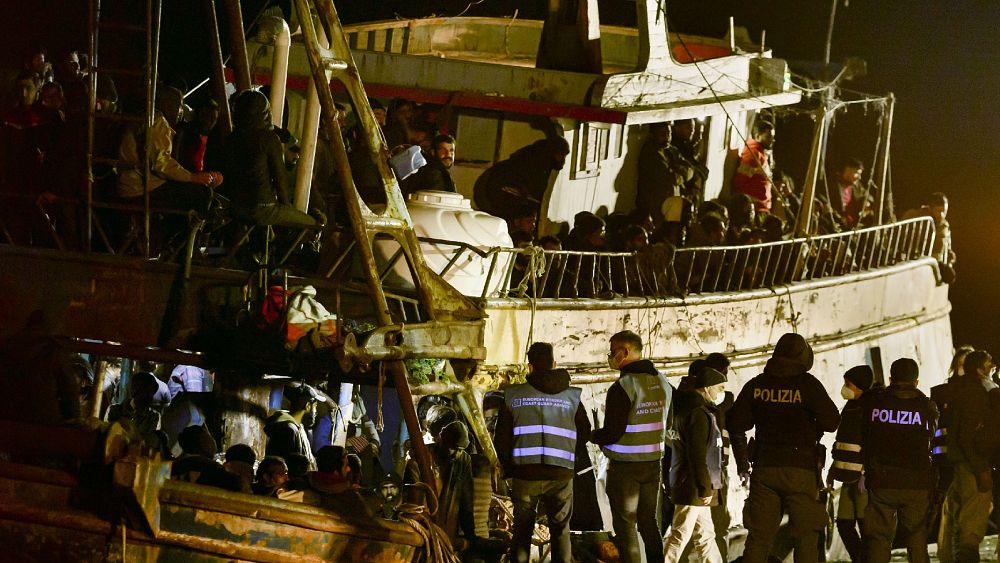
Intelligence reports indicate nearly 700,000 migrants are in Libya awaiting an opportunity to set out by sea toward Italy, a lawmaker from Premier Giorgia Meloni’s far-right party said Sunday, but a UN migration official called the number not credible.
Tommaso Foti, the lower parliamentary house whip for the Brothers of Italy Party, told television channel Tgcom24 the Italian secret services estimated that 685,000 migrants in Libya, many of them in detention camps, were eager to sail across the central Mediterranean Sea in smugglers’ boats.
Separately, 30 migrants were missing and 17 were rescued some 100 nautical miles (180 kilometres) from Libya’s coast after their boat overturned while a commercial vessel was trying to take them aboard, the Italian coast guard reported Sunday night.
Stressing that the capsizing happened outside Italy’s area of search-and-rescue responsibility, the coast guard said several other merchant vessels were helping to look for the boat’s missing passengers.
The humanitarian group Alarm Phone signaled to Italy’s national coordination centre and to Libyan and Maltese authorities on Saturday that the boat with 47 people on board needed assistance.
Libyan authorities, citing “lack of naval assets availability,” contacted the Rome-based maritime aid coordination centre, which sent a satellite message about an emergency to all ships in the area, according to the Italian coast guard statement.
It said the commercial motorboat that took on the 17 survivors was headed for Italy but would first stop in Malta to disembark two people in urgent need of medical care. A spokesperson for the Libyan coast guard did not respond to a request for comment
Meloni is hoping a European Union meeting later this month yields concrete solidarity from fellow leaders of EU nations in managing the large numbers of migrants and asylum-seekers who come to countries on the Mediterranean’s rim, including Greece, Cyprus, Malta and Spain as well as Italy.
“Europe can’t look the other way,″ Foti said.
While the intelligence services assessment sparked alarming headlines in Italy, a spokesperson for the International Organization for Migration cautioned that the figure appeared to be confusing the high end of the estimated number of migrants in Libya with those who were actually seeking to head from there to Europe.
“This number seems to be an estimate, that we also give, of the total presence in Libya,” Flavio Di Giacomo told The Associated Press in Rome.
But of that number “only a minimum part want to leave and only a minimum part succeeds in leaving” for Europe, Di Giacomo said. For example, many migrants in Libya come from Niger and Chad, two African nations on Libya’s southern border, and eventually return to their homelands, he said.
The Italian intelligence service’s estimate “is the last of a long series of alarms that we’ve seen in the last 10, 12 years, that turned out to be mistaken” Di Giacomo said. ”That number doesn’t seem to be absolutely credible.”
Some 105,000 migrants reached Italy by sea in 2022.
From the start of this year through March 10, some 17,600 arrived, including a few thousands who disembarked at Italian ports in the last several days. That’s about triple the number for the same time period in each of the two previous years, although the COVID-19 pandemic might have led to fewer voyages.
On Sunday, three more bodies were found from a Feb. 26 shipwreck just offshore the Italian peninsula, raising the known death toll in that disaster to 79 migrants, Italian state TV said. A wooden boat that had sailed from Turkey ran into a sandbank in rough seas off a beach in Calabria, the toe of the Italian peninsula.
There were 80 survivors, and an undetermined number of people were believed to be missing and presumed dead.
Meloni’s government has rebuffed criticism that the coast guard should have been sent out to rescue the boat’s passengers when the vessel first was spotted farther off the coast.
For years, Italy has tried with limited success to induce Libya to stop launches of people smugglers’ unseaworthy fishing boats and rubber dinghies toward Italian shores. Italian governments have trained and equipped the Libyan coast guard.
But the traffickers behind the smuggling rings continue to operate amid Libya’s amid feuding political and militant factions.
The International Organization for Migration and humanitarian groups say passengers whose vessels are turned back by the Libyan coast guard often are returned to detention camps, where they are at risk of abuse, including torture until their families raise enough money for the migrants to set out again by sea.
Meloni’s government has made it harder for humanitarian organisations that operate rescue boats to carry out many rescues in the waters off Libya, adopting rules that force the vessels to disembark migrants in northern Italian ports, delaying their return to sea.
However many migrants actually set out from Libya on smugglers’ boats, it “is a worrisome humanitarian flow because people die at sea,” said IOM spokesperson Di Giacomo.
The UN migration agency estimates that some 300 people have died this year, or were missing and presumed dead, after attempting to cross the perilous central Mediterranean route.


